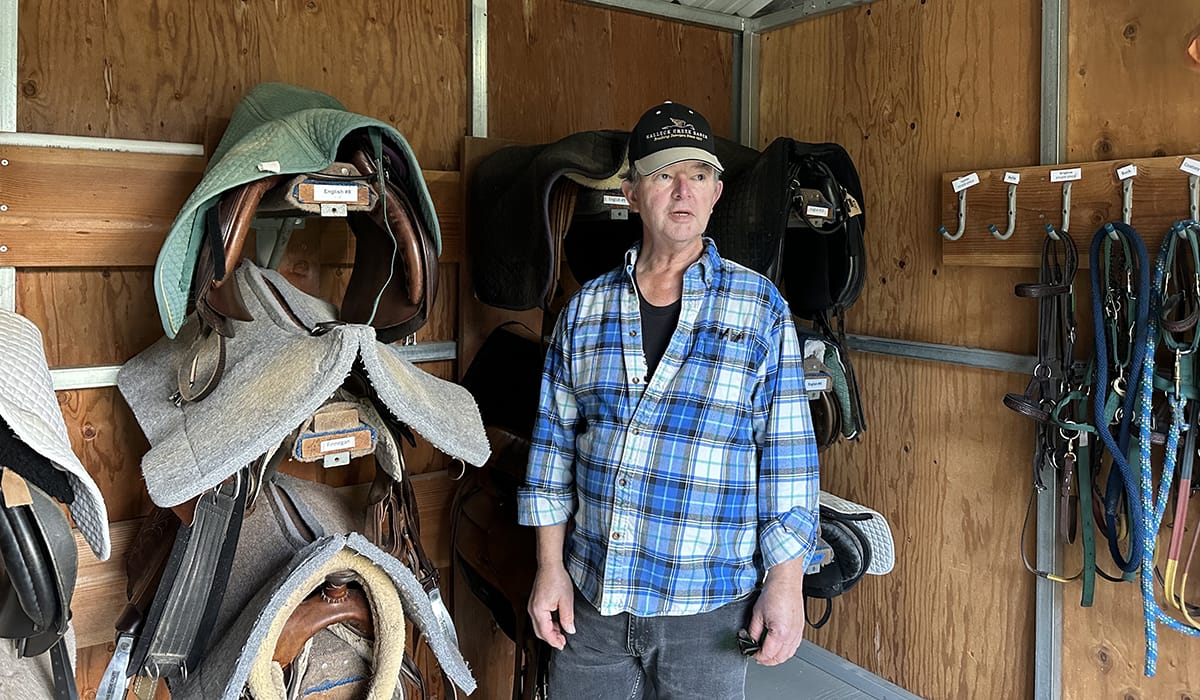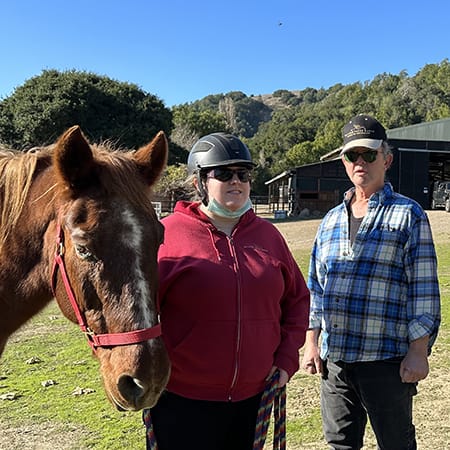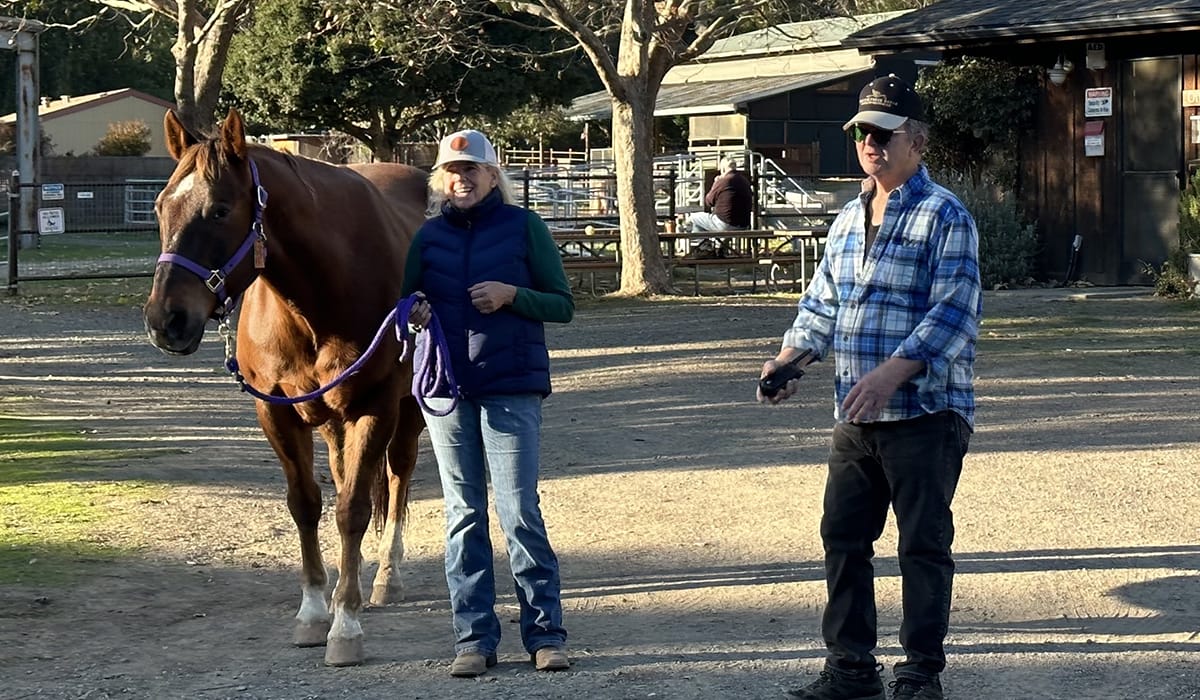Volunteer Supports Life Without Barriers Through Therapeutic Riding

Meet Daily Point of Light Award Honoree Jim Rutherford. Read his story, and nominate an outstanding volunteer or family as a Daily Point of Light.
Jim Rutherford enjoyed a long career with Chevron where he worked as an internal statistical consultant. The job was fairly solitary, and Jim, a self-described “extreme introvert,” found that volunteering on the weekends was a way to come out of his shell. He did some volunteering at a local food bank and served as a volunteer coordinator or “Captain of the Welcome Team” for his church.
As a teen, Jim’s daughter was participating in a school program that included community service. She found Halleck Creek Ranch (HCR), an equestrian facility that offers therapeutic riding as well as unmounted horse-handling skills to people with disabilities. Since his daughter was 14 at the time, Jim had to drive her to the ranch. He figured, “Why not join her?” And so began his volunteer journey with therapy horses and their riders. He has served in various capacities at HCR since then, even throughout cancer treatment and after a stroke.
What inspires you to volunteer?
The time I get to spend with horses is very important to me. We have 18 horses at the ranch, all with different personalities. The community I’ve become part of at Halleck is amazing. The staff, volunteers, parents, caregivers and riders have all become family. I like to say, “I’ve never met a mean person out here.” The location is beautiful and so peaceful. It’s a wonderful place to spend a day. Halleck Creek Ranch has recently received an incredible donation: an entire 200+ acre ranch. We received local news coverage when that happened. A lot of people found out about the ranch and as a result, we got more volunteers, donations and riders.
Tell us about your volunteer role with Halleck Creek Ranch.
I volunteer two days a week. I perform horse care, I catch the horses, groom and tack them before the riders come, side-walk with the riders and then untack the horses and return them to their stalls or pastures.
I have a real affinity for our horses and riders. I particularly enjoy side-walking. Side-walking means walking next to the rider, engaging and ensuring the rider’s safety. The horse leader, which is a role I also enjoy, manages the horse.

We have riders of all ages with a wide range of mental and physical disabilities. Some of our riders are in wheelchairs, some use walkers or canes and others are able-bodied. Some of our riders are autistic, and I’ve found that I relate particularly well to them, probably because I’m extremely introverted. Some of our staff say I have a calming effect on the horses and the riders. I hadn’t been around horses much before this. I always try to understand what’s going on in the horse’s mind. I learn from their facial expressions, body language and of course, their ears. I have learned that you can take this huge animal that weighs a quarter to a half-a-ton, and you can control them with a rope and one hand — not by force but by understanding them and developing a bond.
The ranch offers four sessions a year. A session is 8 to 10 weeks long with rides or ground activities happening typically once a week. Some people ride, while others are involved with ground work like grooming and caring for the horses. We have riders who have been involved with Halleck for over 10 years. They started out as kids, and now are adults who still love to spend time with the horses. I fill in wherever I’m needed, and help out with fundraising events like our auctions and other community events.
What inspired you to get started with this initiative?
My daughter was in high school when she started volunteering at Halleck. Our drives to the ranch were memorable. I had time to spend with my daughter, and volunteering together was a special experience. Eventually she went to college, and I kept volunteering. We often go out to the ranch when she comes home to visit from college. HCR is a very special place. I’m honored to be part of it.
What are your long-term plans or goals for the organization?
I plan on volunteering at Halleck for as long as I am able. Now that we have the second ranch, some of our horses can go into full retirement. I’m glad to see that the new ranch is being used by other groups as well. There’s one organization that works with autistic young adults who come to the new ranch to hike and do other activities. There’s also a PTSD veterans support group that comes out to the new ranch.
What’s been the most rewarding part of your work?
It’s rewarding when I can really relate to a rider, when I can really relate to a horse and when I hear someone say I work well with the horses. I believe it’s my introversion that has helped me relate to our riders, especially the nonverbal ones. One interesting thing that happened to me is that my whole life I’ve been an extreme introvert and talked very little. I had a stroke one-and-a-half years ago. One of the outcomes of that stroke is a change in my personality. I’ve become much more social, and people say I talk a lot now.
What have you learned through your experiences as a volunteer?
I can control a horse. This was new to me. Since I’ve been volunteering at Halleck, I have gained an intimate knowledge of horses. I find that I can also communicate with people I never expected I could connect and communicate with. The riders are so excited, so happy. Everybody at the ranch, from the staff to the volunteers and riders, has such great energy.
I have become a more vocal advocate of the ranch and its services. Since my stroke, I’ve begun joining a Zoom support group for traumatic brain injury (TBI) survivors, including stroke survivors. One day I saw someone I recognized from work on the call. She had also suffered a stroke and has some physical ailments, and she’s now riding at Halleck Creek Ranch. She found out about the ranch from me. Another man from the support group is in a wheelchair, and he’s riding too. I’m not sure if I played a role in getting them out to the ranch but I hope so.
We hold a fundraiser every year. One part of the fundraiser is a silent auction, online auction, and a live auction with a real auctioneer. I like to participate in the auction by making a significant donation. The auction fever is contagious. If they see me bidding, they’re more likely to bid. I have often come home with silent auction items.
Tell us about future partnerships, programs or events that you are excited about.
Our holiday party for the staff, volunteers and riders is coming up. It will be held at the ranch house at the new ranch. We’ll bake cookies, enjoy a potluck, games and Santa may even appear. One of our white horses is a former dressage horse with a lot of presence. She gets decorated too. People love to see the ranch and some of the horses all decked out for the holidays.

Why is it important for others to get involved with causes they care about?
People talk to young people who are anticipating their career and say, “Find your passion.” You don’t have to look too far to try out something new and what you find can become your passion and a huge part of your life. I especially encourage people who are retired to start volunteering. People think when they retire that all they can do to fill their days is to learn to play golf. That’s something to do, but it’s nowhere near as rewarding as going out and helping someone who can really use the help. It’s hard to make the transition from a very involved rewarding career to retirement. When you retire, you may feel a letdown. Suddenly you don’t have a sense of purpose, but volunteering can fill that void.
Any advice for people who want to start volunteering?
Do it! It depends on where you are in life but think about how much time you can make available. Everyone is so busy, but if you make the time, you will find that volunteering is the most rewarding time you spend. If you find something you enjoy and you can learn something, you will feel great. I found a whole community that is now a big part of my life.
What do you want people to learn from your story?
Right now, I’m starting my second round of treatment for cancer, but through all of this, through the cancer and the stroke, I can still help. The ranch community has allowed me to be able to continue helping. It’s important to stop being the victim. Change your focus from yourself. Go out and help.
Everyone has a story. When you volunteer, you hear so many incredible stories. People are so diverse and fascinating, and I would never have talked to them had it not been for this opportunity. My therapist told me I should start talking to my plants. Sure, that works, but I have also learned to talk to horses. That’s an incredible skill. You have to control yourself, figure out where you are, and figure out where the horse is and then you make the connection.
Do you want to make a difference in your community like Jim? Find local volunteer opportunities.
